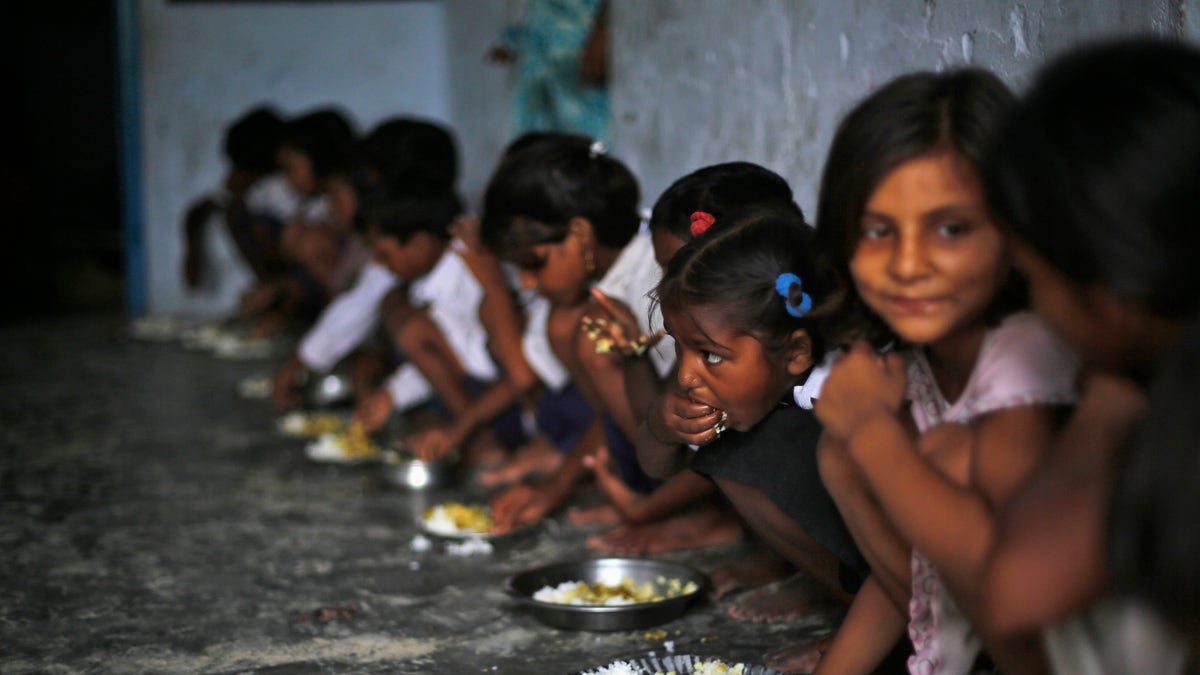
School children eat their free mid-day meal, distributed by a government-run primary school in the eastern Indian state of Bihar July 19, 2013. (REUTERS/Adnan Abidi)
In the aftermath of the school lunch poisoning in Bihar, India last week, which resulted in the deaths of 23 children, questions have been raised about how similar tragedies can be prevented in the future.
Despite recent events, India’s government-run midday meal program for schoolchildren is considered to be a largely successful initiative, according to Greg S. Garrett, director of the Global Alliance for Improved Nutrition’s (GAIN) Large Scale Food Fortification Initiative.
“It has been historically quite successful, one of the longest running and largest in the world,” Garrett told FoxNews.com. “The Indian government has been successful in rolling it out and can be applauded for doing it in a way that showed children stay in school longer, increased retention rates and (improved) academics.”
India’s midday meal program was first introduced in the 1960s, and today the initiative reaches an estimated 120 million schoolchildren. Garrett noted that despite the program’s largely successful track record, both the national and state governments will now be tasked with reevaluating and improving upon safety standards and protocols related to the midday meals.
“They will be looking at it - and they should - and there will be directives coming to the state level,” Garrett said.
Though the midday meals program was set up by India’s national government, individual responsibility for the implementation of the program falls to the states, Garrett noted. Furthermore, the actual preparation of each meal is carried out entirely on a local level.
“The cooking and supply of the actual meal is entrusted to a variety of organizations from local women’s groups, to youth clubs to volunteer organizations,” Garrett said.
At the school where the poisonings occurred, the Associated Press reported the school’s principle, Meena Kumari, had purchased pesticide-contaminated oil from a shop owned by her husband. Immediately following the school lunch, around 50 children, most reported to be between the ages of 5 and 12, became ill and had to be rushed to a local hospital.
Garrett believes that improving upon quality assurance and quality control standards related to both the purchase and preparation of foods at the local level could help prevent another disaster such as this one in the future.
“They do check the institutions preparing foods but maybe not regularly enough,” Garrett said. “I don’t think there’s good systematic training among food providers on food safety and quality – and there are also really not a lot of protocols and checklists used by internal manufacturing. It could be improved upon.”
Improving upon the implementation of tools like checklists, to ensure that anyone handling food follows proper safety protocols, could have a large impact on improving food safety in the midday meals program.
“It’s as simple as washing hands; it’s as simple as washing the floors on a regular basis. Those checklists go a long way to help,” Garrett said.
Another improvement Garrett hopes to see includes setting up a system in which complaints about the midday meal program – whether about the taste of the food or the standards of preparation – can be filed and addressed in a timely manner.
“There are complaints, nothing like (what occurred with the poisonings), but ongoing complaints around taste, nutrition quality of the food,” Garrett said. “We’ve noticed that it is addressed in an ad hoc or irregular way. So a proper redressal system for grievances put in place could also help.”
Furthermore, better care should be taken when examining the supply chain for the foods served in the midday meals program.
“We need to look at the supply chain as well. The internal quality assurance control, safety and checklists. But where is the food coming from to begin with? In this case, the oils should never have been purchased and used in the school meal,” Garrett noted.
Though improvements need to be made, Garrett is confident that the government will be able to implement the necessary changes and avoid another disaster like the one in Bihar.
“Sure, there are time constraints, budget constraints and a bureaucracy in place, as in any government. But they can get it done,” Garrett said. “Millions of children have graduated from school because they have this incentive to go and eat these foods.”
GAIN, an organization dedicated to fighting malnutrition in children, was created in 2002 during a special session of the United Nations’ General Assembly on Children. The alliance has worked with the midday meals programs in the Indian states of Rajasthan and Andrya Pradesh to improve intake of iron, zinc, vitamin A and folic acid for school children. They have not yet worked with the state of Bihar.
